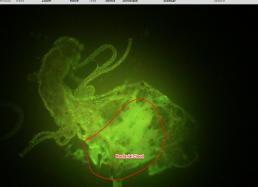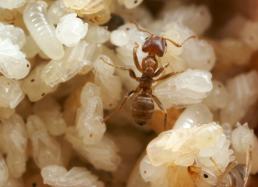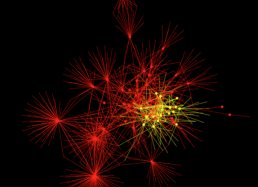Beneficial Bacteria
For a long time, we've believed that the adaptation and evolution of a species is driven entirely by its external environment—its habitat and food supply. But scientists now think that evolution might also be driven by an animal's internal environment—the microbes that live within it and help it make the most of all available resources.
For example, while an animal may be able to find a meal in a changing environment, its helpful gut bacteria may not be able to adapt to this new diet so quickly. Without the digestive aid provided by the bacteria, the animal may die. New studies are revealing that for a species to survive, thrive, and diversify, the health of the community living inside it may be just as important as the health of the community it lives in.
Bacteria's Role in Digestion
Several questions come to mind when considering the role of gut bacteria. Does an animal's internal chemistry dictate which bacteria a body can harbor? Is this chemistry determined by diet, genetics, or both? And exactly what role do the bacteria play—are they themselves nutritional, or do they break down food into component parts, some of which benefit the host? Or perhaps these microbes are simply part of the immune system, killing off bad bacteria that enter an animal's gut by riding on its food.
Labeling bacteria as "bad" or "good" doesn't always work, either. Too much of one kind of bacteria may be as harmful as too little. For example, scientists now know that when the community of Helicobacter pylori living in the human gut grows too large, ulcers often erupt. But when H. pylori levels drop too low, asthma, esophageal cancer, and other ailments can result. Balance is key in the bacterial commmunity.
Ant & Bacteria
Because Costa Rica's Area de Conservación Guanacaste (ACG) harbors such a wide variety of ant species with different feeding strategies, it's the perfect place to learn more about how diet, bacteria, and environment intertwine to affect diversity. Specifically Dr. Moreau's team is hoping to find out whether different ant species share the same bacteria, since they share the same habitat, or whether each ant species hosts its own specific bacteria based on its role as predator, scavenger, mutualist, or parasite.
By eliminating all gut bacteria and then reintroducing one species at a time into the diet of captured ant populations, the team hopes to learn whether it's just one bacterium, or a whole suite of bacteria working together, that are needed for a species to thrive. The team's careful studies of both the ants and their gut residents can then help shed light on the co-evolution of bacteria and host species—and perhaps provide details on how to maintain healthy bacterial communities for ants that play vital roles in the tropical ecosystem.




